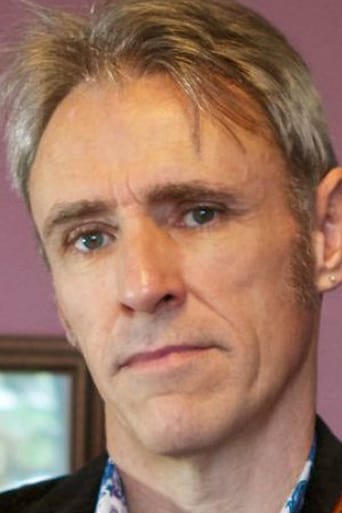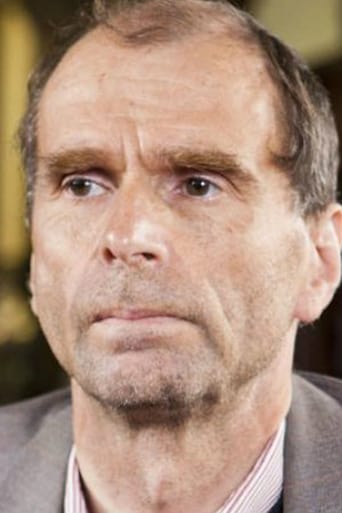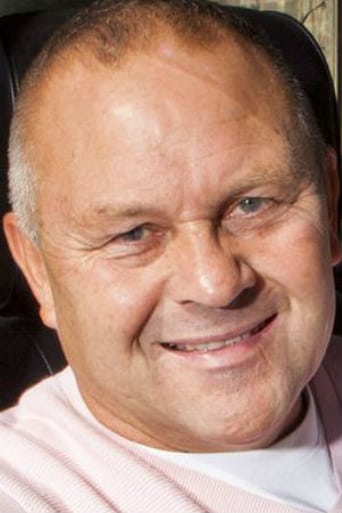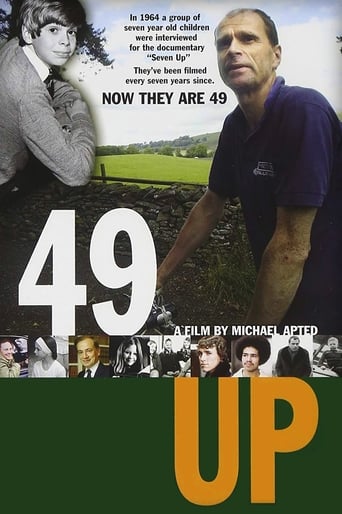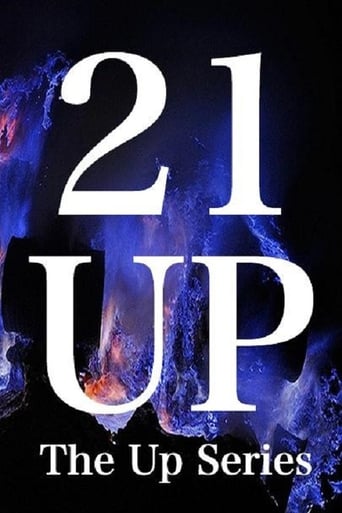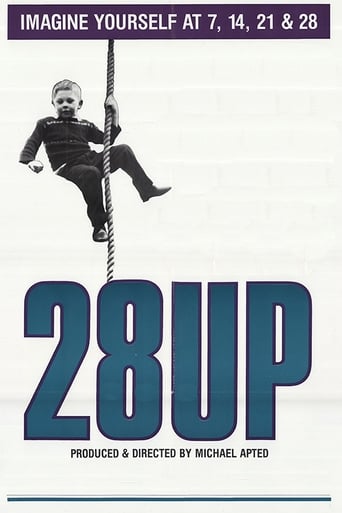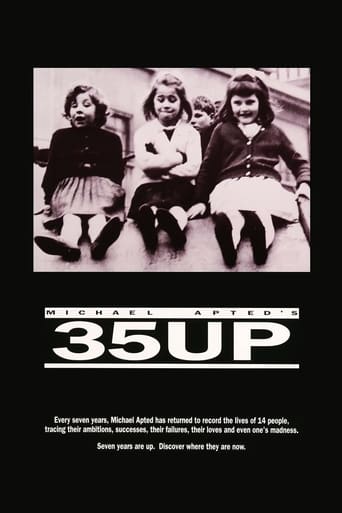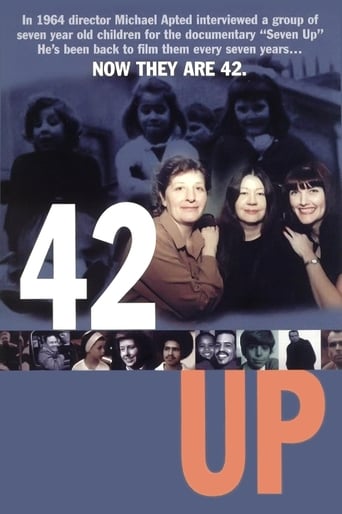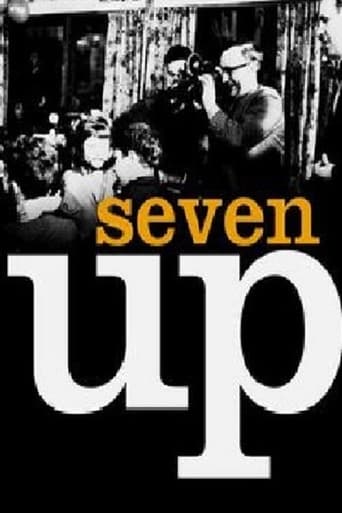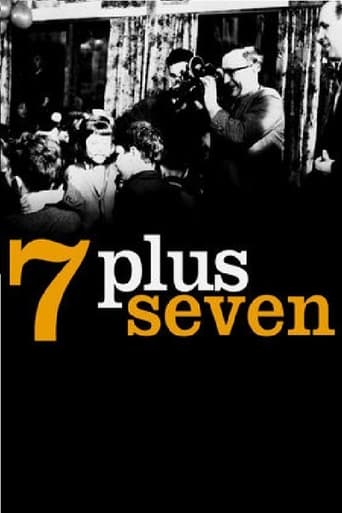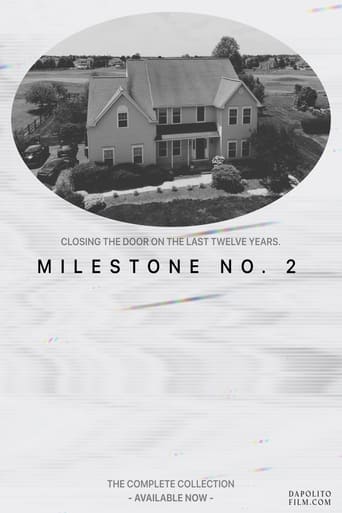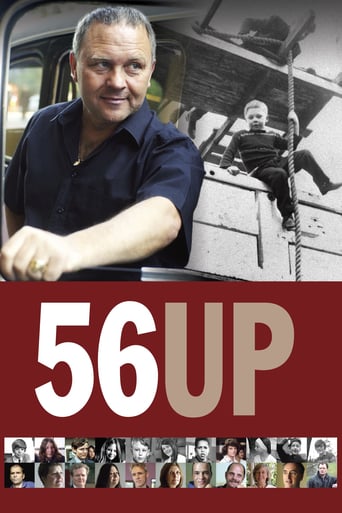
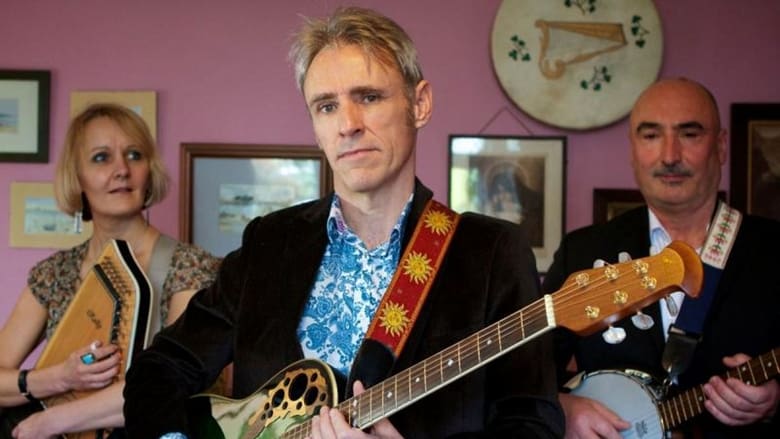
56 Up (2012)
When a cross-section of seven-year-olds were interviewed for 7 Up in 1964 it was immediately evident that their social backgrounds influenced their attitudes towards life. While the upper class children were confident and self-assured, those from middle and working class backgrounds were resigned to a challenging life of hard work. This premise was put to the test every seven years when the same group were interviewed about the progression of their lives. 49 years in the making, the changes that occurred to the original 14 make for fascinating television and are in many ways the stories of all our lives. From success and disappointment, marriage and childbirth, to poverty and illness, nearly every facet of life has been captured on film. Now, at the age of 56, the group are once more brought together and, with the benefit of hindsight, assess whether their lives have been ruled by circumstance or self-determination.
Watch Trailer
Cast


Similar titles
Reviews
And here we are, for the last chapter of Michael Apted's "Up" series. Fourteen lives I've been following from their childhood to the age of maturity. And seeing them getting older and wiser, contemplating their achievements, has always made me consider my own life... hasn't anyone?This is not a series about lives, but Life. And these persons were no laboratory rats though the initial purpose of the "Seven Up" short was to make a point on the British class system. Granada Productions' bias was even more obvious since they didn't select kids from middle classes (not many girls too). But the more the subjects grew on life and on us, the less these considerations mattered.And for once, I won't be too analytical, I think maybe the key to this show's appeal is the likability of all the subjects. They are different, but they are all good and decent. And this struck the man I am belonging to their children's generation. Indeed, had "Up" been about Millennials, there might have been more "Neils" and less "Pauls" or "Andrews". Here, they had their share of ups and downs, separations, health issues, deaths but they always managed to look at the bright side of life. And maybe the program did play a part to that.Indeed, in my "49 Up" review, I didn't take Suzie's reluctance to participate in '56' for granted, and I was right. And it was a pleasant surprise to see Nick sitting next to her. Together, they have grown a friendship due to their rural upbringing and agreed on many points about the limitating format of the program, that it only offered short glimpses on their lives but the merit was in the lessons and perspectives offered by the sums of all these experiences.Suzie and Nick were critical but they were there all right, reckoning the cathartic value of the documentary as each 'time' snapshot of their lives allowed them to stop once in a while and examine their previous accomplishments like their own viewers, before becoming actors again. And for similar reasons, the other participants admitted a sense of commitment to the documentary... not to mention, friendship with Apted. I could swear I hear them calling him "Michael" more than all the previous episodes put together. Even Jackie who had settled a few records in '49'. This "56" edition was as fascinating as the "49" because it really reflected a new attitude toward life, let alone the camera. Was it a coincidence that separate participants revealed new elements about their lives at that particular episode? John regretted that he was constantly shown as a privileged child while his father died when he was 9, Andrew finally revealed that the "Financial Times" line was something his father told him to say. Like for Jackie in the previous episode, we realize that the documentary format can't reflect the deep and complex aspects of reality, but doesn't social life work on the same flawed way? At least, they're able to be vocal about a few misconceptions. Another happy twist was Peter's return after 28 years, he left the show after a massive press backlash following harsh comments on Thatcher's policy. He's back with another wife, playing in a musical band, and satisfied to have created at least something of 'valuable' durability. This episode is really one surprise after another as if Apted himself was aware of the artificiality of narratives and deconstructed the very format that structured the show. Charles isn't shown anymore (I read that he sued Apted forcing him to remove his footage, what an irony for a fellow documentary maker) and even the order of appearances has been altered. We don't see the three "lower class" girls together anymore, Neil appears at the start and he seems very active as a District Counsellor and a religious clerk, and it's only at the end that we meet Tony. I used to consider Neil the "soul" of the show, but what would the "Up" series be without Tony, the cab driver who's apparently more famous in Britain than Buzz Aldrin? Collecting the memories of his youth again, I find it very ironic that Tony had to gain "The Knowledge" to become a cab driver. In fact, this could refer to all the participants, they all gained a form of knowledge, even Simon confessed that he was too lazy to study and kept on looking for excuses. Acknowledging that is a form of knowledge. There's nothing more humbling than the passing of time and what we take for wisdom is simply the capability to say "What do I know?".I tried to play the Sorcerer's apprentice when Paul's wife said the show kept them together, I was thinking of Nick and Peter's wives and maybe something seemed already shaky in their marriage, as if you could adapt the Jesuit maxim of a "show me a kid until he's seven and I'll show you the man" for a marriage at seven months. I think the consensus is that you can't predict what will happen to someone, but maybe there's a core-personality that never changes, and that can take many directions driven by life circumstances, for better or worse. And that's just the way it is. Finally, after watching the final opus (so far); I went on reading their bios on Wikipedia and I was saddened by the death of Lynn in 2013. But was it a surprise? Wasn't it a miracle that none of the died in 49 years? Now, should it go on to 70? 84? They've became a part of my life and now, for the next two years, I'll be missing the show and that "at the end of the day" sequence with that thrilling score at the end. Paraphrasing the original narrator, this has been quite a glimpse! And an experience I shall never forget!
The "Up" documentary series comprises what is surely the most impressive longitudinal study ever committed to film. It is an obvious labor of love for director Michael Apted, who has remained faithful to the project - and to its participants - for close to fifty years now. It all began in 1964, when producers at Britain's Granada Television gathered together a group of seven-year-olds from all walks of life and interviewed them for a TV documentary entitled "7Up," focused on the hopes and aspirations of these youngsters as they embarked on a long but uncertain journey into the future. Every seven years since, like clockwork, Apted has gone back to these individuals to take a peek into their lives, examining the paths they've taken and juxtaposing those youthful aspirations expressed in the original film with the realities of their lives as they've played themselves out. (The stunning contrast between the grainy black-and-white imagery of the first film and the hi- def clarity of the current interviews underlines the extraordinary length of time the series has already covered).In "56Up," the eighth installment in the series, its subjects are leaving the confidence and security and general good health of middle age and just beginning to confront the realities of impending old age and contemplating an array of end-of-life issues (if not for themselves yet, at least for their parents). And it is for this reason that "56Up" is one of the most poignant and insightful entries in the series (and one imagines it will only get more poignant and insightful with each successive edition). All the major issues of marriage/divorce, career and parenthood seem to have long ago been settled for most of them, as they now concentrate on their roles as grandparents and life guides for their own adult children as they embark on their own lives and families. There's less naïve hope expressed in this film and more of an acceptance of how life has turned out for the participants, though there is a marked lack of cynicism and pessimism in the way they speak about their lives. Of course, they're still young enough at this point to be physically active and fully engaged in their careers and their communities, but there's no denying that the prospect of that fast- approaching downward slope of life is weighing, at least to some degree, on these people's minds. Yet, even those who haven't yet achieved their "ideal" lives still haven't given up hope that they will one day find what it is they're looking for. For obvious reasons, it is this installment that most comprehensively captures the range of a lifetime, at least until "63Up," "70Up," etc., arrive on the scene in the lead-up to the foreordained conclusion of the series.It's clear from watching this jumble of clips from eight distinct periods of time that each stage of life contains a set of joys and concerns unique unto itself, a universal truth that this series, by its very nature, seems singularly equipped to illustrate. It's a bit like thumbing through - an admittedly disorganized - family photo album, but with insightful commentary from the individuals involved inserted along the way.One, perhaps unforeseen, thread that runs through this film involves the self-reflection on the part of some of the participants about their appearance in the series - the sometimes unwelcome notoriety it has brought to them and their lives, with at least one of them pulling out of the project for a time only to reconnect with it at this stage, after having come to terms with himself and grown confident in his own skin. A few even question the very value of the series itself, feeling that these brief glimpses into their lives every seven years fail to create anything close to a true portrait of their lives and of themselves as people - a concern that Apted deserves much credit for including in his final product. After all, these people, at seven years of age, did not exactly ask to become a part of this much-viewed series, and why SHOULD they want to be defined and represented by it? On the other hand, as one of the participants points out, the series really isn't about these particular individuals as much as it is about how, collectively, they serve as a sort of mirror in which the rest of us can see our own lives reflected.Yet, something indefinable and intangible keeps many of them coming back every seven years to open up and share at least a small part of their lives with us. And for that the world shall be eternally grateful. Now onto the next installment.
Personally, I would strongly suggest watching the films in order. While "56 Up" does provide some recaps, the cumulative effect of the series is built by watching each age in depth.The 'Up Series' represents one of the most fascinating and unusual uses of film in cinema history - a documentary life-long chronicle of the lives of 14 people starting at 7 years old, revisiting them every seven years through age 56 (so far). While I could quibble, wishing for a bit more depth here and there (especially with the women, where there's a bit too much emphasis on love and marriage at the expense of all else), and by nature the later episodes sometimes have to speed through more than would be ideal,since they have to both catch the audience back up as well as moving the stories forward, no matter. It's really an astounding, moving, frightening and uplifting document. There's no way to watch this remarkable series of films without reflecting deeply on one's own life, and how you have changed (and stayed the same) over your own lifetime. While Michael Aped deserves every bit of credit he's received for this amazing piece of cultural anthropology,it's important to note the first film, 7 Up, was actually directed by Paul Almond, and Apted was a that point a researcher for the project.This new episode is as excellent as it's predecessors, revealing more surprising twists in turns as our group heads towards the end of mid-life, and stare into the realities of old age. Some old friends re-appear, some have continued in directions they had been going in, and some have changed course yet again. One thing that's interesting, and more present in this episode than earlier ones are some of the subjects questioning the objectivity and 'reality' of the series. There are interesting cases made that what we, the audience, sees isn't the truth of who these people are, but only a created character. It also (by proxy) makes one reflect on how much being in these films has affected the lives of the participants. Just as in physics, it seems to be true here as well, that the very act of being observed changes what is being observed.All fascinating and thought-provoking stuff.
The Up Series (1963 - 2012 Granada UK) continues "56 Up" (2012 Granada UK) is the latest episode in the series and was aired in the UK on May 14, 2012. Home video DVD's are not yet available for "56 Up" (2012 Granada 2012) from Amazon.Com. It seems there is a delay from the time the newest episode is first aired/ released in the UK and when the USA sees and may purchase it.)For me, the two most remarkable and worthy persons profiled are Neil Hughes and Bruce Balden, neither married or materially "successful" by the 1991 "35 Up" episode, both badgered about that on camera by the off camera interviewer, both stoic and dignified in the face of the negative evaluation the interviewer provides.Neither man, Hughes or Balden, led conventional, predictable, profitable, "safe" lives. Both opted for exploration, adventure, and service to and comradeship with socially unprestigious groups and persons.Both took enormous chances, and must be accounted brave, noble men for that alone. They didn't "play it safe." Both exude an intelligence and a willingness to discuss difficult questions and issues in detail on camera, and neither attack the show they appear on, the thoughtless, implicitly insulting interviewer, or the show's and interviewer's obvious prejudices and agenda for the show itself as a piece of social and political propaganda.Balden and Hughes use the riveting show as a platform to describe their own lives, ideals, and activities in pursuit of those ideals, activities not supported by outside big money or generous support from family, government, or other sources.We learn more about the world at the times the episodes are presented (every 7 years starting in 1963.....the most recent one in 2004) from observing and listening to the words and ideas of Bruce Balden and Neil Hughes by far than is true of the other children and adults presented, none of whom departed from the settings where they first appeared at age 7 in 1963.Neil Hughes and his "marching to the beat of the different drummer" (quote from Americn Utopian writer Henry David Thoreau) seems to me the most impressive of all. He's become the intrepid explorer he announced he'd be at age 7 when he expressed interest in being an Astronaut or a bus driver....two flavors of explorers. I'm reminded of the words of poet T. S. Eliot (1888 USA - 1965 UK), the USA born poet who settled in England and got the Nobel Prize in 1948. He wrote a poem titled East Coker, and words from it include the following: -------------- "To arrive where you are, to get from where you are not, You must go by a way wherein there is no ecstasy. In order to arrive at what you do not know You must go by a way which is the way of ignorance. In order to possess what you do not possess You must go by the way of dispossession. In order to arrive at what you are not You must go through the way in which you are not. And what you do not know is the only thing you know And what you own is what you do not own And where you are is where you are not. ---------------------- "Home is where one starts from. As we grow older The world becomes stranger, the pattern more complicated ------------ "Old men ought to be explorers........" -------------------------- Everybody should be an explorer, not just old men. Neil Hughes purposed to be an explorer at age 7, started early, still does it. He could be the star of a long run reality TV Show titled "King Of The Road" using the famous Roger Miller hit song of that title from the 1960's, and his views about dealing with and surviving in spite of unsupportive, unintelligent government and present social organization and conventions in the UK, the USA, Australia, and elsewhere could be solicited and published, his lifestyle and behavior widely (and proudly) imitated.This may all seem far-fetched (see the Academy Award Winner movie titled Network [1976] to see how big media could set this up....no joke!), but the fact is Neil Hughes has probably learned more about the realities of survival and the likely challenges and problems upcoming which must be survived successfully than most people. People won't get the truth about big issues they face from the government, big religion, or the conventional commercial mass media, nor will big establishment educational systems either provide answers nor seek them.Neil Hughes knows what others need to know, and is clearly independent enough to share what he knows, able to survive being despised for his independent and necessarily implicitly critical views.It's an interesting show, and less spectacular careers and worlds of the children/ adults who traveled different, more predictable and conventional paths than Bruce Balden and Neil Hughes are worth noting and following.The Up Series (1963 - 2012) is a happy accident, the truth provided by the commercial mass media in ways almost never experienced. BTW, see the excellent interview with director/ producer Michael Apted (1941 UK - ) done by USA Movie Critic of fame Roger Ebert in the "Special Features" section of "49 Up [2005)." Ebert praises the show to the skies. ----------------- Written by Tex Allen, SAG-AFTRA movie actor, Columbia PA USA Email Tex Allen at [email protected] Tes Allen Movie Credits, Biography, and 2012 photos at WWW.IMDb.Me/TexAllen. See other Tex Allen written movie reviews....almost 100 titles.... at: "http://imdb.com/user/ur15279309/comments" (paste this address into your URL Browser)


